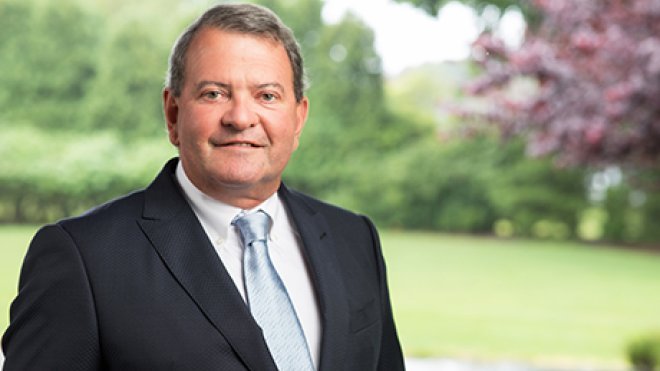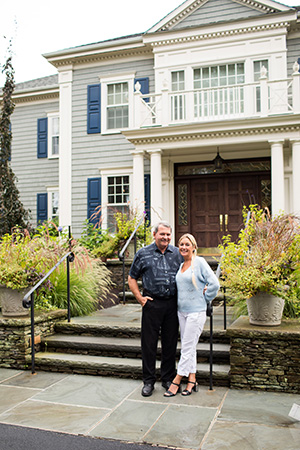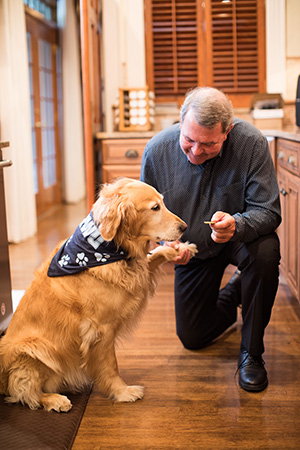RWU Begins the Next Chapter, Led by President Miaoulis
In August, Ioannis Miaoulis took the helm as RWU’s 11th President

BRISTOL, R.I. – In just his first weeks on the job as RWU’s 11th president, President Ioannis Miaoulis dove headfirst into campus life whirling back into action for the start of the fall semester. During RWU Law orientation day, he greeted new law students between classes, and at Convocation he welcomed first-year and transfer undergraduates, acknowledging his shared status with them as a new Hawk. Rolling up his sleeves, he helped students move into their new home at RWU and pitched in with the entire first-year class for community service in our local communities on Feinstein Community Connections day.
His momentum had already begun well before his first day, meeting with students, staff and faculty across the university, and regional leaders, holding 30 listening sessions to hear their questions and ideas and offer insights into the kind of president he hopes to be. That is, a community-driven leader, strategic thinker, collaborator, and seasoned fundraiser who will lead efforts to increase support and connections to raise the profile of Roger Williams nationally.
“With its unique mix of liberal arts and professional programs, top-notch faculty, the state’s only law school and a hub of innovation in Providence, Roger Williams University is positioned to become a national model for transforming higher education. RWU’s distinctive focus on experiential education and community engagement is preparing all learners to excel in a rapidly changing world – and to tackle the problems that matter most to society,” Miaoulis said.
 Before RWU, he served as president and director of Boston’s Museum of Science since 2003, introducing more than 1.5 million visitors a year to science, technology, engineering and mathematics. During his tenure, he brought in $500 million in fundraising that helped transform the museum into an internationally-acclaimed resource for STEM education and supported the creation of world-class exhibits, outreach programs, and innovative educational initiatives. He also founded the museum’s National Center for Technological Literacy, introducing engineering and technology through K-12 curricula programs that have reached an estimated 18 million students.
Before RWU, he served as president and director of Boston’s Museum of Science since 2003, introducing more than 1.5 million visitors a year to science, technology, engineering and mathematics. During his tenure, he brought in $500 million in fundraising that helped transform the museum into an internationally-acclaimed resource for STEM education and supported the creation of world-class exhibits, outreach programs, and innovative educational initiatives. He also founded the museum’s National Center for Technological Literacy, introducing engineering and technology through K-12 curricula programs that have reached an estimated 18 million students.
His career in higher education began at his alma mater, advancing to Dean of the College of Engineering and Associate Provost during his 16 years of service at Tufts University. As dean, he helped raise $100 million for the engineering school and worked closely with students and faculty to more than double its research initiatives, introduce new programs, form professional partnerships within the industry, and significantly increase the number of female students and faculty members.
As leader of RWU, Miaoulis will continue to champion the university’s vision to strengthen society through engaged teaching and learning by delivering an experiential education that prepares our students to graduate ready to thrive in successful careers and interact with society in mutually rewarding ways.
Looking Ahead, a Q&A with President Miaoulis
Question: What does it mean to be the university the world needs now?
Answer: To be the university the world needs means we must pay attention to all that is happening beyond our campus borders. We must listen to what the world needs, be in dialogue with industries and communities, and form partnerships that enable our students to help solve problems through academic research. There isn’t just one model of a university that will work for all students throughout all time. So “now” is meaningful to us, because now is always changing and points directly to a larger issue in higher education – it’s too often slow and unmoving. To continuously ask what the world needs now requires us to adapt, to be nimble and responsive so that our students are prepared to succeed in a rapidly changing world.
Q. What do you want to accomplish with this year’s strategic planning process?
A. We need our planning to be “action-oriented.” The Vision Project can serve as an excellent guide for us, but we need to make sure we do not just create a plan to sit on a shelf. We must move quickly from strategy to action, because the world will adapt whether we act or not. And we must involve everyone on campus.
Q. What are your other priorities for the university during your first year?
A. Beyond working on the strategic plan, I want 1.) create a more inclusive environment that welcomes and values all expressions of diversity and identity, and to guide the launch of a university-wide Equity Action Plan; 2.) to identify and explore areas of interdisciplinary strengths, such as coastal resilience and sustainability; 3.) to expand our external partnerships to include corporations and build a nationally-representative board of trustees that believes in and can advance our mission; 4.) and to develop a campus master plan that will outline improvements to academic spaces, facilities and residence halls.
 Q. How will you foster a culture of philanthropy in the RWU community?
Q. How will you foster a culture of philanthropy in the RWU community?
A. To create a culture of philanthropy means that everyone on campus must see themselves as a potential fundraiser, and not just expect the president or advancement team to do all the work. Every office plays a role, from faculty and staff who are the most passionate advocates for their programs, all the way through how facilities play a critical role in making our campus welcoming and safe. Additionally, I hope we can create a culture where students see themselves as “alumni-in-training” by making sure they not only form a strong connection to the university, but also recognize that their future success was possible, in part, to the time they spent with us and that will inspire them to pay it forward.
Q. What are you most looking forward to this year?
A. I love meeting students, faculty and staff and hearing their stories. Those stories will have the power to inspire not only me and the work we will do together during this year of strategic planning, but also the donors with whom I share your stories. Stories have the power to bring to life how a donor’s gift will make a difference to the campus and to the lives of our students.